Know Cancer’s Next Move
How do you guide treatment decisions when next steps are unclear?
Signatera™ Molecular Residual Disease (MRD) Assay is a highly sensitive and custom designed test, using circulating tumor DNA (ctDNA) to help inform treatment decisions.
Informing treatment decisions along the continuum of care

Use Signatera™ after surgery to evaluate the need for adjuvant chemotherapy.
Use Signatera™ alongside CEA and imaging to detect recurrence earlier.

Assess a patient’s response to treatment in the neoadjuvant, adjuvant or immunotherapy settings.

Identify high risk patients with progressive disease who may benefit from earlier intervention or additional imaging.
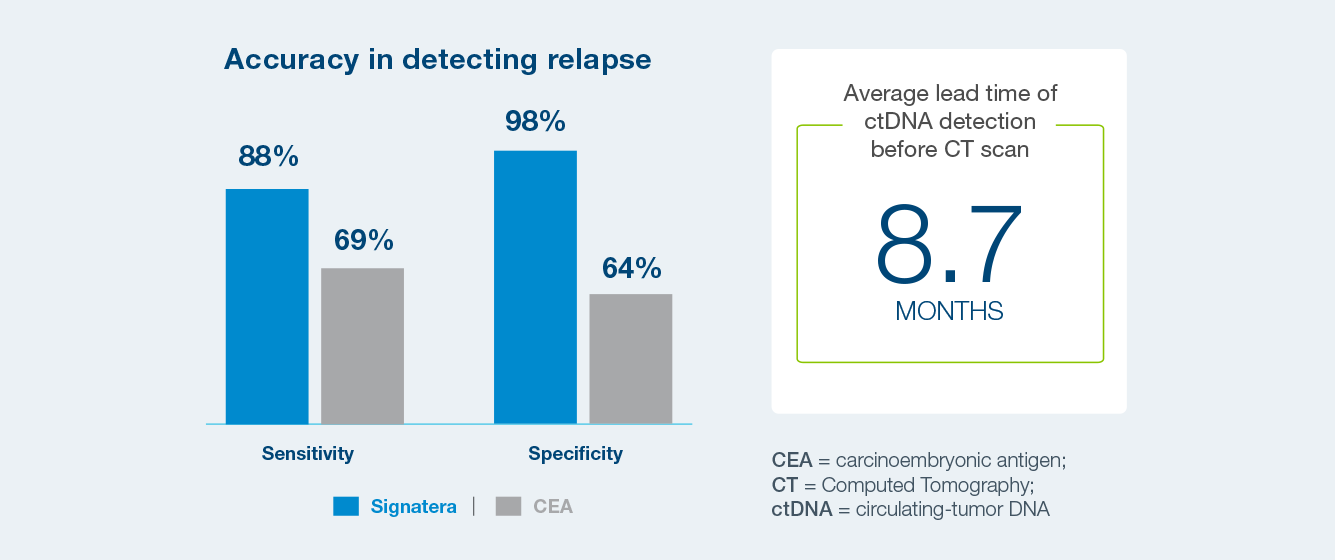
Prognostic of disease recurrence across multiple tumor types
Signatera™ is specifically designed and validated for molecular residual disease (MRD) detection and treatment response monitoring
- Custom-designed using the patient’s own tumor tissue
- Identifies and tracks tumor mutations at the source
- Validated to detect disease recurrence across multiple tumor types1-5
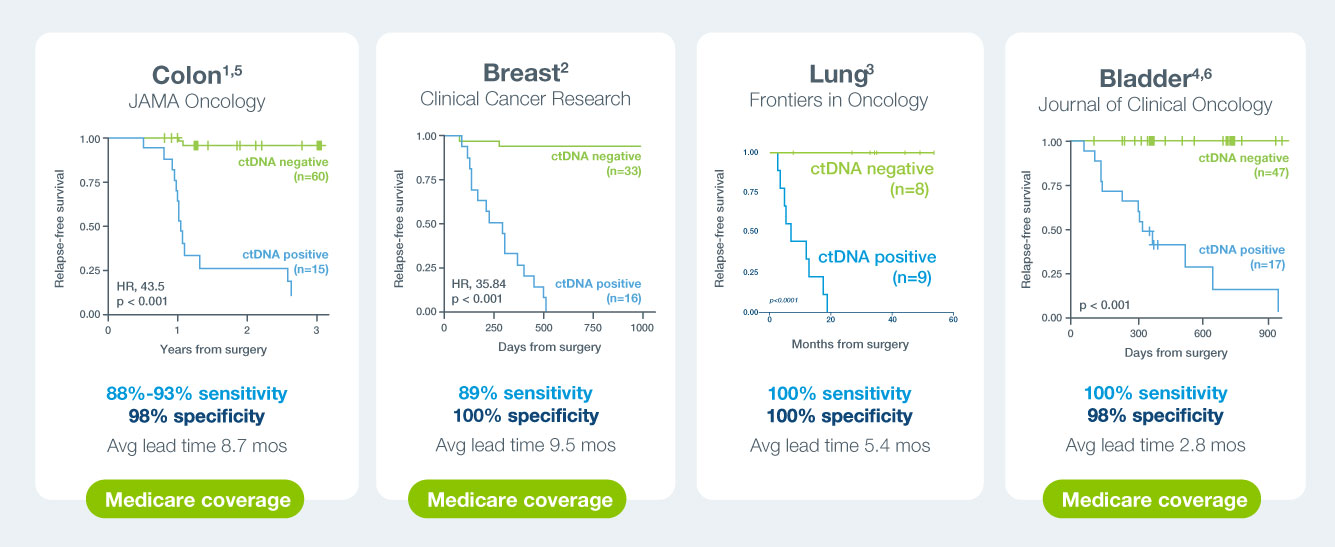
Clinical applications of ctDNA testing
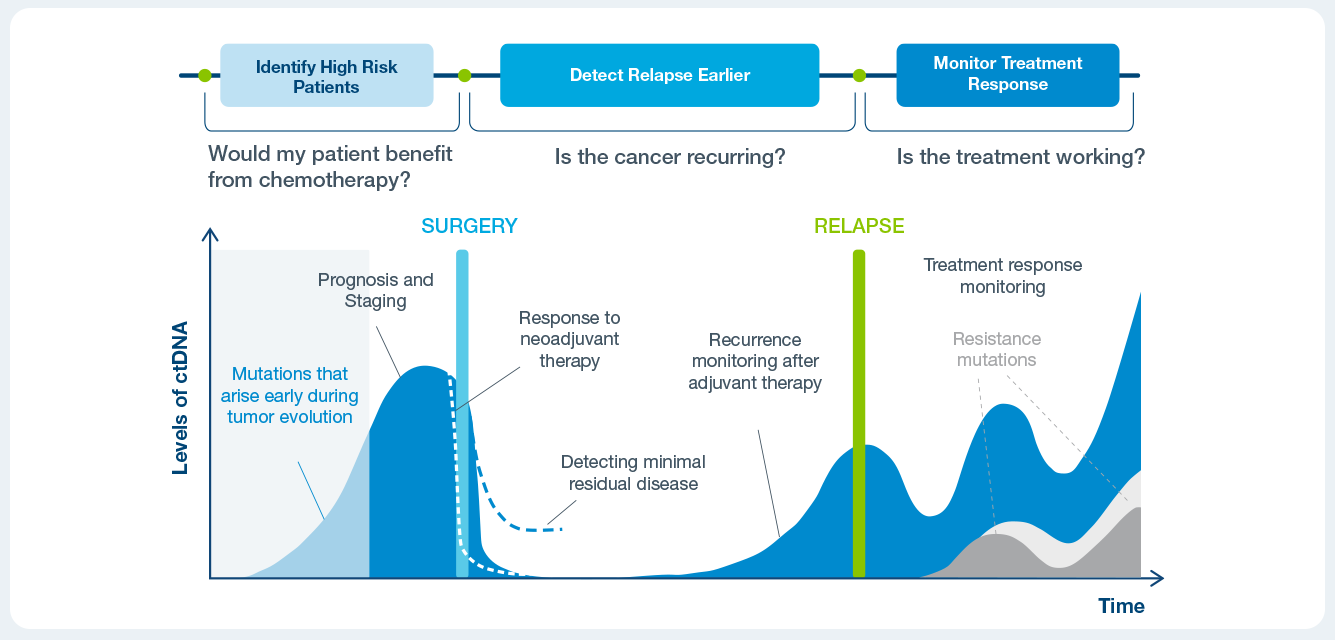
Postoperative ctDNA status is highly prognostic for cancer recurrence
At the 2023 European Society for Medical Oncology (ESMO) Congress in Madrid, Natera and its collaborators shared an expanded GALAXY analysis that builds on results published in January 2023 in Nature Medicine [link to paper]. With 2,625 CRC patients and disease-free survival (DFS) assessment at 24 months, this analysis includes more than twice the number of patients and significantly longer follow-up than the previously published 18-month findings.
Key highlights include:
Circulating tumor DNA (ctDNA) negative patients continued to show exceptional DFS regardless of adjuvant chemotherapy (ACT) treatment.
- No significant difference in DFS at 24 months was observed for ctDNA negative patients receiving ACT compared to those with no ACT (88.3% DFS v. 89.9%, p-value 0.156).
- Lack of absolute risk reduction between the two groups further improves on the previously published analysis.
The presence of post-surgical ctDNA was the most significant prognostic factor for disease recurrence and was predictive of chemotherapy benefit.
- ctDNA positive patients receiving ACT had significantly higher DFS at 24 months compared to those with no ACT (38.6% DFS v. 16.1%, p-value <%0.01).
- Patients with ctDNA positive results had significantly lower DFS at 24 months than ctDNA negative patients (31% v. 89%, p-value <%0.01).
- In a multivariate analysis, ctDNA status continued to be the most prognostic factor for cancer recurrence (HR 10.44).
Early ctDNA dynamics were predictive of recurrence.
- Changes in ctDNA status at 3 months post-surgery were significantly associated with DFS at 24 months.
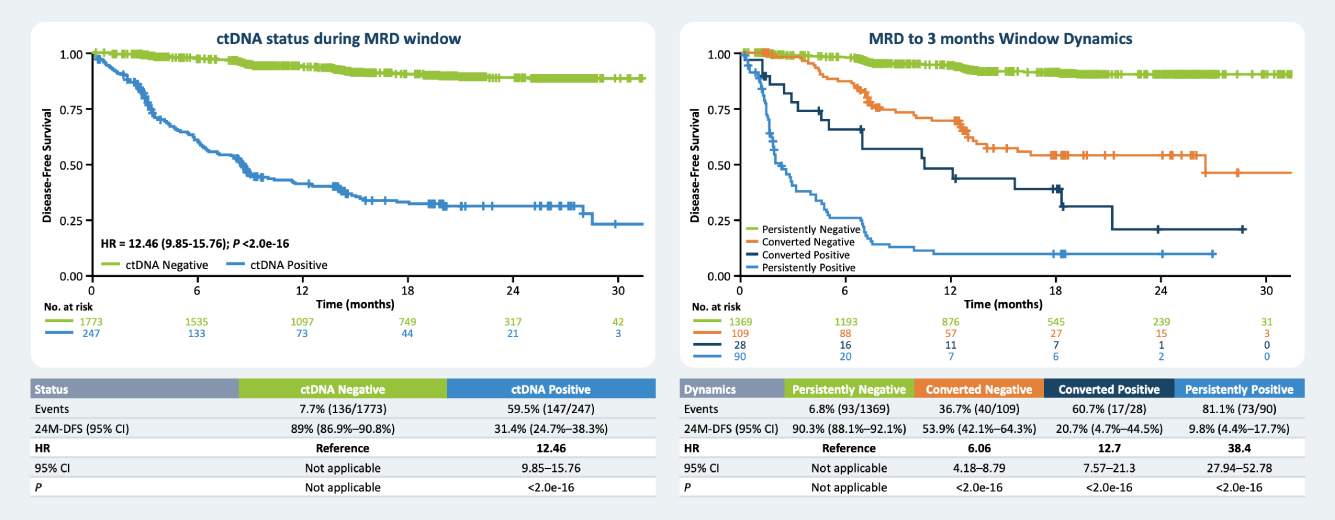
Increasing levels of ctDNA is strongly associated with poorer patient outcomes.
As we have seen in recently presented data, stage III CRC patients who do not clear their ctDNA after curative intent treatment are likely destined to relapse.
Hear how Dr. Dayyani uses Signatera™ and ctDNA status in this stage III patient to help determine next steps to ensure the most favorable outcome.
Tracks Disease Burden Over Time via ctDNA Dynamics
- Signatera™ is designed to accurately detect residual disease with an ultra-low level of detection (0.01% MTM/mL)
- Real time ctDNA analysis can help inform important adjuvant therapy decisions
- Signatera™ can also track ctDNA dynamics so you can gain real-time insight of disease burden.
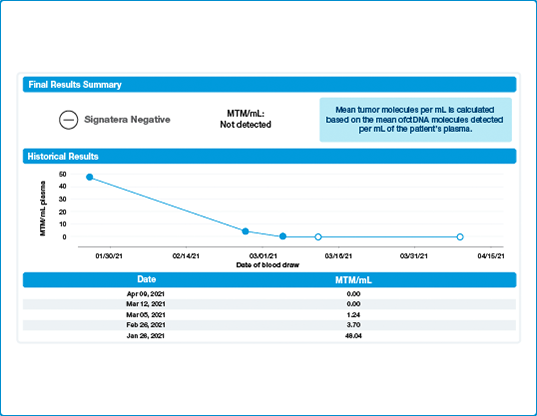
Hear how Beth was able to get back to living after her stage III CRC treatment
Hear the amazing journey of one stage III colorectal cancer patient and how her treating physician used Signatera™ to inform next steps of her treatment.
Is Signatera right for your patients?
We’re here to help you find out
References
1Reinert T, Henriksen TV, Christensen E, et al. Analysis of Plasma Cell-Free DNA by Ultradeep Sequencing in Patients With Stages I to III Colorectal Cancer. JAMA Oncol. 2019.
2Coombes RC, Page K, Salari R, et al. Personalized Detection of Circulating Tumor DNA Antedates Breast Cancer Metastatic Recurrence. Clin Cancer Res. 2019;25(14):4255-4263.
3Abbosh C, Birkbak NJ, Wilson GA, et al. Phylogenetic ctDNA analysis depicts early-stage lung cancer evolution. Nature. 2017;545(7655):446-451.
4Christensen E, Birkenkamp-Demtroder K, Sethi H, et al. Early Detection of Metastatic Relapse and Monitoring of Therapeutic Efficacy by Ultra-Deep Sequencing of Plasma Cell-Free DNA in Patients With Urothelial Bladder Carcinoma. J Clin Oncol. 2019;37(18):1547-1557.
5Kotani D. et al., Molecular residual disease and efficacy of adjuvant chemotherapy in patients with colorectal cancer, Nature Medicine v29 Issue 1 Jan 2023

